Veranstaltungen und Aktivitäten
DIJ researchers at EAJS, EACS, and ICAS virtual conferences
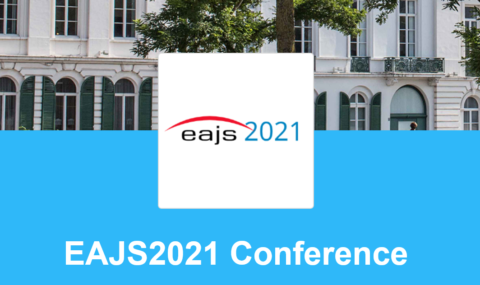
Every three years, Japanese Studies experts from all over the world present their latest research at the European Association for Japanese Studies (EAJS) conference. From 24-28 August, Franz Waldenberger, Susanne Brucksch, Isaac Gagné, Sonja Ganseforth, Barbara Geilhorn, Markus Heckel, Nora Kottmann, Harald Kümmerle, Torsten Weber, and Yufei Zhou will participate in this year’s virtual EAJS conference as presenters, discussants, or chairs in the sections ‚Anthropology and Sociology‘, ‚Economy, Business and Political Economy‘, ‚Language and Linguistics‘, ‚Intellectual History and Philosophy‘, ‚Urban, Regional and Environmental Studies‘, and ‚Performing Arts‘. Programme and details here. In addition, Yufei Zhou will give a presentation on „Transoceanic Contacts in the Making of Sinological Knowledge“ at the European Association for Chinese Studies (EACS) conference on August 27 and Sonja Ganseforth will present her book publication Rethinking Locality in Japan (Routledge 2021), co-edited with DIJ alumnus Hanno Jentzsch, at the International Convention of Asia Scholars (ICAS) on August 28.
New edited volume on Locality in Japan
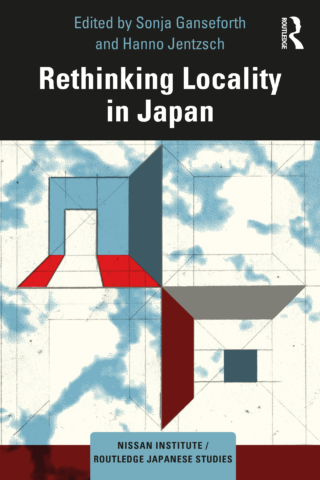
What does it mean when we say „local“ and what does „local“ mean in the Japanese context? Rethinking Locality in Japan, edited by DIJ researcher Sonja Ganseforth and DIJ alumnus Hanno Jentzsch (Vienna), examines broader political and socio-economic shifts in Japan through the window of locality. It covers demographic change, electoral and administrative reform, rural decline and revitalization, welfare reform, and the growing rift in energy and food production. Chapters discuss the different ways in which locality in Japan has been reconstituted, from historical and contemporary instances of administrative restructuring to more subtle social processes of making and unmaking local places. Contributors include the co-editors Sonja Ganseforth („Territorialized yet Fluid Locality: Reform, Consolidation, and the More-than-Human in Japanese Fishery Cooperatives“) and Hanno Jentzsch („San’ya – The Making and Unmaking of a Welfare Quarter“) as well as DIJ researchers Barbara Holthus („The Meaning of Place for Selfhood and Well-being in Rural Japan“, with Wolfram Manzenreiter) and Isaac Gagné („Mapping the Local Economy of Care: Social Welfare and Volunteerism in Local Communities“). The volume is an outcome of the DIJ’s research focus The Future of Local Communities in Japan.
New ‚Citizen Science in the Digital Age‘ Opinion Paper
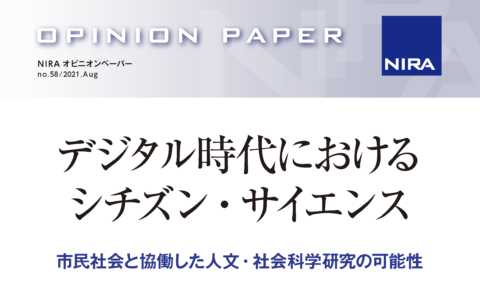
Citizen science, in which citizens and scientists collaborate to generate and utilize data and knowledge, is an important approach to co-creating society. While citizen science in the natural sciences is well established, it is still in its infancy in the humanities and social sciences. To use the citizens‘ knowledge to solve social problems it is necessary to design protocols for citizen participation, to involve universities in supporting citizen science, and to build data provision and management systems that take into account data ownership and privacy protection. At a conference co-organized by the NIRA Research Institute, the DWIH Tokyo, and the DIJ, researchers from Japan and abroad discussed the possibilities of citizen science to contribute to the development of research in the humanities and social sciences. DIJ director Franz Waldenberger contributed the closing comments. The opinion paper ‚Citizen Science in the Digital Age‘ based on this conference has now been published (in Japanese). A PDF version is available for download here
New journal article examines post-3.11 plays and cultural trauma
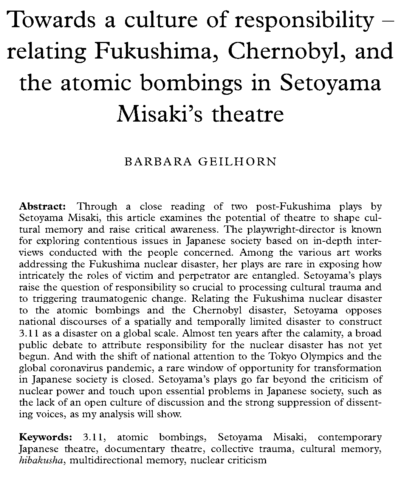 A new journal article by DIJ researcher Barbara Geilhorn studies two post-Fukushima plays by Setoyama Misaki to examine the potential of theatre to shape cultural memory and raise critical awareness. Among the various art works addressing the Fukushima nuclear disaster, Setoyama’s plays are rare in exposing how intricately the roles of victim and perpetrator are entangled. Relating Fukushima to the atomic bombings and the Chernobyl disaster, Setoyama opposes national discourses of a spatially and temporally limited disaster to construct 3.11 as a disaster on a global scale. Setoyama’s plays go far beyond the criticism of nuclear power and touch upon essential problems in Japanese society, such as the lack of an open culture of discussion and the strong suppression of dissenting voices, as the analysis shows. The article is an outcome of Barbara’s research project Local Issues Take Stage – Culture and Community Revitalization. It was published in Japan Forum, online first, and can be accessed here.
A new journal article by DIJ researcher Barbara Geilhorn studies two post-Fukushima plays by Setoyama Misaki to examine the potential of theatre to shape cultural memory and raise critical awareness. Among the various art works addressing the Fukushima nuclear disaster, Setoyama’s plays are rare in exposing how intricately the roles of victim and perpetrator are entangled. Relating Fukushima to the atomic bombings and the Chernobyl disaster, Setoyama opposes national discourses of a spatially and temporally limited disaster to construct 3.11 as a disaster on a global scale. Setoyama’s plays go far beyond the criticism of nuclear power and touch upon essential problems in Japanese society, such as the lack of an open culture of discussion and the strong suppression of dissenting voices, as the analysis shows. The article is an outcome of Barbara’s research project Local Issues Take Stage – Culture and Community Revitalization. It was published in Japan Forum, online first, and can be accessed here.
DIJ expertise on Tokyo Olympics in international media

The Tokyo Olympics are now history — but what remains as their legacy? During the past few weeks several international media have interviewed DIJ director Franz Waldenberger and deputy director Barbara Holthus as well as principal researchers Sonja Ganseforth and Torsten Weber on different aspects of the Games. Franz Waldenberger commented on the exploding costs of Tokyo 2020 for Tagesschau online and the DLF Players podcast. Barbara Holthus appeared in live TV interviews on Al Jazeera, the BBC and was quoted in AP News, DLF radio, HR radio, Welt, and several other German and international media. An interview with Sonja Ganseforth on the anti-Olympic protests appeared in Japanese in the Mainichi daily newspaper. Comments by Torsten Weber on Tokyo’s Olympic past appeared in the Neue Zürcher Zeitung, Frankfurter Rundschau, Münchner Merkur, and Weekendavisen. For more information on research related to the Olympics, see the DIJ’s special project on the Tokyo Olympics and the open access book publication Japan Through the Lens of the Tokyo Olympics.
Summer issue of DIJ Newsletter published
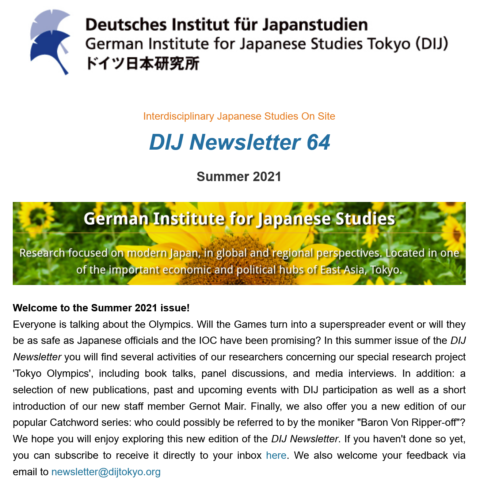
We have just published the summer issue of our DIJ Newsletter featuring updates on our research, publications, and outreach activities. In this issue you will find a selection of our recent and forthcoming activities, including a panel discussion on the Tokyo Olympics in cooperation with the Japanese-German Center Berlin (JDZB); a Web-Forum series on Digital Transformation; new book publications by Susanne Brucksch, Barbara Geilhorn, Sonja Ganseforth, and our alumnus Hanno Jentzsch; a profile of our new staff member Gernot Mair; a new edition of our Catchword series; and much more. We hope you will enjoy exploring this new edition of the DIJ Newsletter. If you haven’t done so yet, you can subscribe to receive it directly to your inbox. The full issue and subscription form are available here.
New Edited Volume on Health and Technology
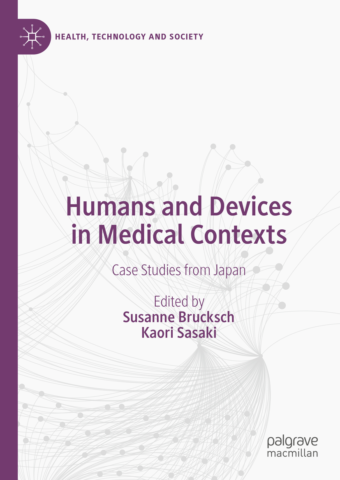
The new book publication Humans and Devices in Medical Contexts. Case Studies from Japan explores the ways in which socio-technical settings in medical contexts are articulated in Japan. It consists of a detailed theory chapter and nine case studies on topics concerning: experiences with radiation in Hiroshima, Nagasaki, and Fukushima; patient security, end-of-life and high-tech medicine in hospitals; innovation and diffusion of medical technology; and the engineering and evaluating of novel devices in clinical trials. The individual chapters situate humans and devices in medical settings in their given semantic, pragmatic, institutional and historical context. A highly interdisciplinary approach offers deep insights beyond the manifold findings of each case study, thereby enriching academic discussions on socio-technical settings in medical contexts amongst affiliated disciplines. The book is edited by DIJ researcher Susanne Brucksch and Kaori Sasaki (Sapporo Medical University). Details
Next DIJ Method Talk on surveys in Japan
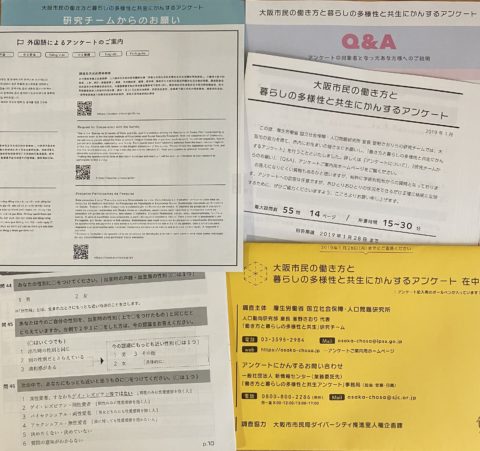
In recent years, issues involving sexual and gender minorities have increasingly attracted attention in Japan. Addressing the lack of data to understand social inequality based on sexual orientation and gender identity (SOGI), Daiki Hiramori and Saori Kamano developed questions to measure SOGI on population-based surveys under the research project “Demography of Sexual Orientation and Gender Identity: Building a Foundation for Research in Japan.” In their talk, they will report the results of a population-based survey and present findings from their preparatory studies and an experimental web survey. The speakers will conclude their talk by discussing two approaches to population sexuality to explore the possibility of a queer demography. Details and registration here
Speakers:
Daiki Hiramori, University of Washington, Seattle
Saori Kamano, National Institute of Population and Social Security Research, Tokyo








 Open Access
Open Access 
